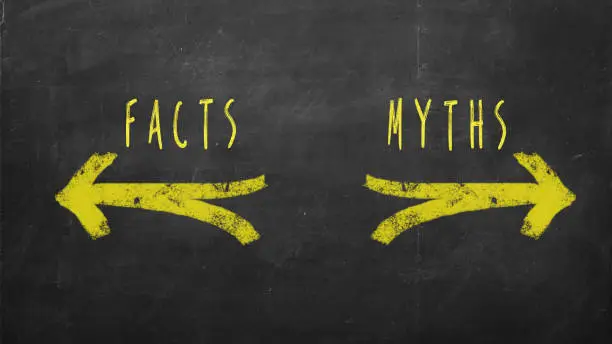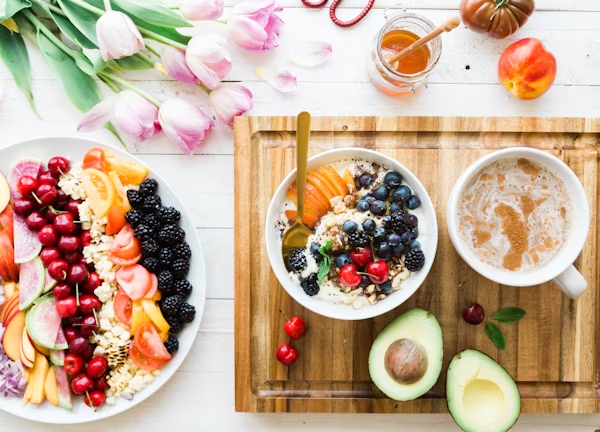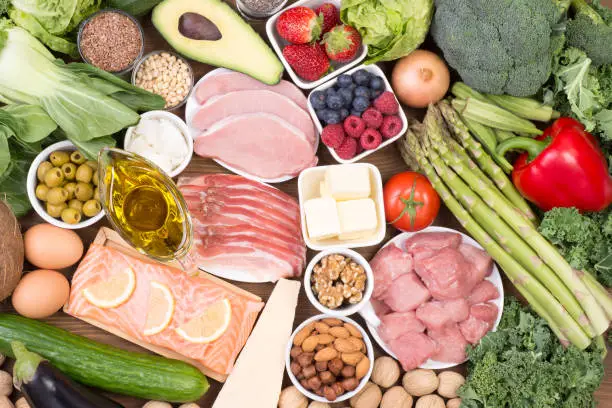Myth 1 – Carbs Are the Enemy
Why carbs get a bad rep
Carbs have been demonized for years. From Atkins to keto, the idea that “carbs = fat” has been drilled into our heads. But here’s the truth: carbs are your body’s primary source of energy. Cutting them out entirely? That’s like trying to drive a car without gas.
The truth about healthy carbs
Not all carbs are created equal. There’s a huge difference between a doughnut and a bowl of oats. Whole grains, fruits, and veggies are packed with fiber and nutrients. It’s the refined, sugary stuff you want to avoid—not all carbs.
Myth 2 – Skipping Meals Helps You Lose Weight
What really happens when you skip meals
Skipping meals may seem like a shortcut to fewer calories, but it can actually slow down your metabolism and trigger overeating later. Your body thinks it’s starving and holds on to fat like it’s gold.
The role of consistent eating in metabolism
Eating balanced meals throughout the day keeps your energy up and your hunger hormones in check. Consistency is key—think fuel, not famine.
Myth 3 – You Have to Cut Out All Fat
Difference between good and bad fats
This one’s stuck around way too long. Yes, trans fats are bad. But healthy fats—like those from avocados, nuts, and olive oil—are essential. They help you absorb vitamins, keep you full, and even support brain function.
How healthy fats support weight loss
Fat doesn’t make you fat—excess calories do. In fact, healthy fats can reduce cravings and help you stick to your nutrition goals more easily.
Myth 4 – Weight Loss Supplements Are a Quick Fix
The hidden truth behind “magic pills”
You’ve seen the ads: “Lose 10 pounds in a week without diet or exercise!” Sounds great, right? But here’s the thing—most weight loss supplements are unregulated and ineffective. Some can even be dangerous.
What science says about supplements
There are a few that may help slightly (like green tea extract or fiber), but no pill replaces hard work, consistency, and a healthy lifestyle.
Myth 5 – Cardio Is the Only Way to Burn Fat
Importance of strength training
Cardio’s great for your heart, but if you want to build a lean, toned body? You need to lift weights. Muscle burns more calories at rest than fat, so the more muscle you build, the faster your metabolism.
How a balanced workout plan works best
Don’t choose between cardio or weights. Mix them for the best results—and toss in some rest days, too.
Myth 6 – Eating After 8 PM Makes You Gain Weight
Where this myth came from
This one likely started with bodybuilders timing their meals, but it’s not relevant for the average person. It’s not about when you eat—it’s about what and how much.
What actually matters: total calorie intake
You can eat at 10 PM and still lose weight if your calories are in check. Your body doesn’t have a magic switch at 8:01 PM.
Myth 7 – You Have to Starve Yourself to Lose Weight
Why extreme calorie restriction backfires
Cutting calories too low makes your body panic. It slows your metabolism, burns muscle, and increases cravings. It’s a recipe for burnout.
Smart calorie deficit strategies
Instead, aim for a small, sustainable calorie deficit. Think of it as gentle nudging, not punishing deprivation.
Why Believing These Myths Can Be Dangerous
Mental and physical effects
Falling for these myths can wreck your mental health and your metabolism. Disordered eating habits, fatigue, and a damaged self-image aren’t worth it.
Creating a toxic relationship with food
When food becomes the enemy, you’re headed down a dark road. Let food be fuel—not fear.
What Actually Works for Sustainable Weight Loss
Balanced diet and exercise
There’s no magic formula. Eat real food. Move often. Get enough sleep. That’s the real secret.
The role of sleep and stress management
Lack of sleep and chronic stress can increase cortisol, leading to weight gain. It’s not just what you eat—it’s how you live.
How to Spot a Weight Loss Myth
Watch out for too-good-to-be-true claims
If it sounds too easy or extreme, it’s probably a myth. Trust your gut—and do your homework.
Trusting science-backed sources
Stick with sources like the Mayo Clinic, Cleveland Clinic, or registered dietitians. Not random TikTok gurus.
Influencers vs. Experts – Who Should You Trust?
The rise of fitness influencers
Instagram is packed with six-packs and smoothie bowls. But most influencers aren’t certified or trained in nutrition.
Why credentials matter
Would you trust a mechanic to do your dental work? Then don’t take diet advice from someone with zero credentials.
The Role of Genetics in Weight Loss
Why some people lose weight faster
Genes influence things like metabolism, hunger hormones, and fat storage. It’s not always a level playing field.
Working with your body type
Instead of fighting your biology, work with it. Personalize your plan and be patient with your progress.
Mindset Matters More Than You Think
Motivation vs. discipline
Motivation comes and goes. Discipline? That’s what gets results. Even when you don’t “feel like it.”
The power of habit building
Small habits, done daily, create massive results over time. Think process, not perfection.
How to Set Realistic Goals
Why small steps lead to big wins
Trying to lose 20 lbs in 2 weeks? That’s a setup for failure. Start with smaller, achievable goals and build from there.
Using SMART goals
SMART = Specific, Measurable, Achievable, Relevant, Time-bound. It’s how you turn dreams into results.
Building a Support System
Why accountability is key
It’s hard to go it alone. Whether it’s a friend, a coach, or an online group, accountability boosts consistency.
Where to find support
Try apps like MyFitnessPal or communities like r/loseit. You’re not in this alone.
Conclusion: Debunking Myths = Taking Back Control
The world of weight loss is flooded with misinformation. But the more you learn, the more power you have to make choices that actually work. Forget fads, focus on facts, and take it one step at a time. Your journey is unique, and you deserve strategies that support, not sabotage, your success.
❓ FAQs
Are cheat days okay during weight loss?
Yes—in moderation! A planned cheat meal can satisfy cravings and keep you on track mentally. Just don’t turn it into a cheat week.
Can drinking water help me lose weight?
Absolutely. Water boosts metabolism slightly, curbs appetite, and helps your body function better overall.
Is intermittent fasting a myth?
Nope! It works for some people, but it’s not magic. It’s just another way to create a calorie deficit.
Why do I gain weight even with exercise?
It could be water retention, muscle gain, or eating more due to increased hunger. Track your progress over time, not day-to-day.
Should I avoid all sugar?
Not necessary. Natural sugars from fruits are fine. The real issue is excess added sugar, which adds calories without nutrients.



